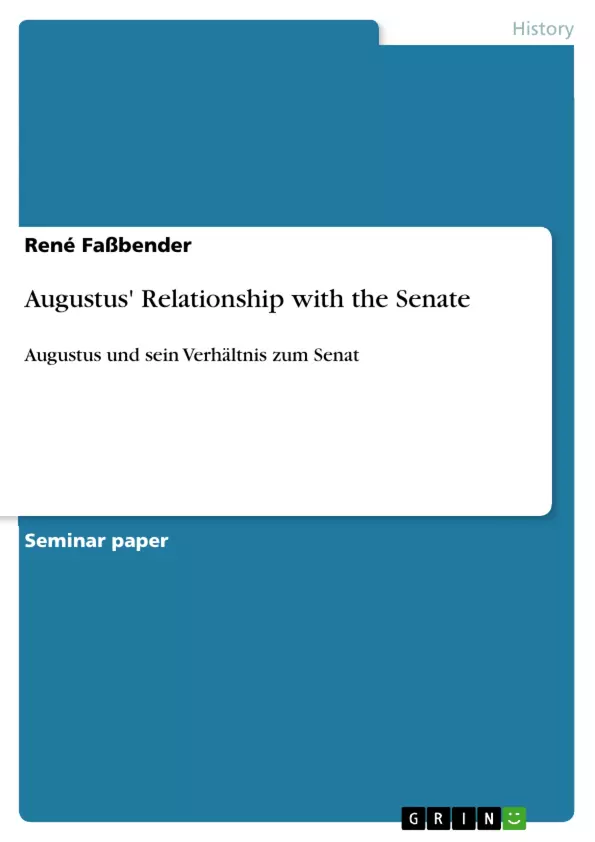After a century of civil wars and wide-spread fear and chaos, a new and promising leader arose, who, despite his comparably humble origins was soon to be called Augustus, the revered one, by the Senators. This once so powerful corporate body saw so much hope in this single man and bestowed numerable honors upon him, through which he eventually outranked all the other Senators in the state. By general consent of the Roman Senators, he arose as the one who would restore the Roman Republic. The events of his reign must strike us as particularly interesting, because it is unclear as to how the Republic can be restored, if an unprecedented shift of power and acceptance of this power within the Senate takes place.
Research agrees that, despite Augustus’ claim to have restored the Republic, the Roman State, during the larger part of his rule, qualifies as a new form of government, namely the Principate, which was to remain the dominant form of government for the centuries to come.
It is therefore an essential question, how and to what extent the Senate changed. What role did it fulfill in Augustus’ government and by which right was it in the Emperor’s hands to initiate all of these changes and how was his own role to be defined?
By taking both ancient and modern sources into account when it comes to appraising Augustus’ actions, this paper shall clarify the legal status of the Emperor and trace the nature of his relationship with the Senate as well as the latter’s purpose within the new government.
Table of Contents
- Introduction
- Augustus' Onset with the Senate
- The Background after Actium
- The Senate under Augustus
- The Emperor's Own Position in the New Government
- Collaboration and the Consilium Augusti
- Conclusion
Objectives and Key Themes
This paper aims to clarify the legal status of Emperor Augustus and analyze the nature of his relationship with the Roman Senate, as well as the Senate's role within the new government. It examines how the Senate's power shifted under Augustus and the extent to which Augustus' actions were truly a restoration of the Republic or the establishment of a new form of government.
- The evolving power dynamic between Augustus and the Senate.
- The Senate's role and function under Augustus' rule.
- The legal basis for Augustus' authority and the changes he implemented.
- The motivations and perspectives of both Augustus and the Senate.
- The transition from Republic to Principate.
Chapter Summaries
Introduction: The introduction sets the stage by highlighting the context of widespread chaos and civil war preceding Augustus' rise. It introduces the central question of whether Augustus' actions constituted a restoration of the Republic or its downfall, emphasizing the controversy surrounding the distribution of power between the Emperor and the Senate.
Augustus' Onset with the Senate: This chapter discusses Augustus' relatively humble origins and the initially unequal relationship with the Senate. It details how the Senate granted Augustus senatorial status and military command, highlighting the unprecedented nature of these actions and different interpretations of Augustus' motivations.
The Background after Actium: This section examines the impact of Augustus' victories at Actium on his relationship with the Senate. It focuses on how Augustus' achievements, particularly his defeat of Mark Antony and Cleopatra, contributed to a desire among the weary senators for peace and stability.
Keywords
Augustus, Roman Senate, Principate, Roman Republic, power dynamics, political transition, imperial authority, senatorial authority, Actium, Res Gestae.
- Citar trabajo
- René Faßbender (Autor), 2007, Augustus' Relationship with the Senate, Múnich, GRIN Verlag, https://www.grin.com/document/124524



